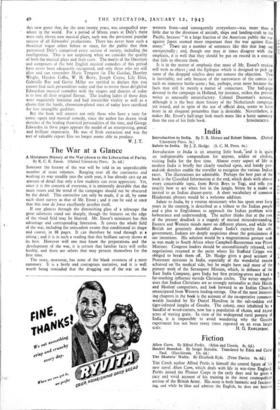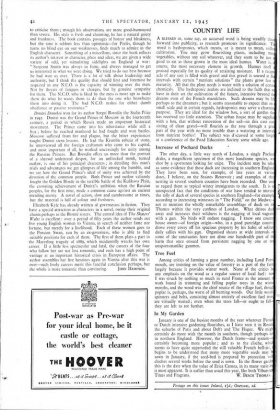Fiction
Alien Corn. By Alfred Peries. (Allen and Unwin. 8s. 6d.).
Dmitri Donskoi. By Sergei Borodin. Translated by Eden and Cedar PauL (Hutchinson. 10s. 6d.) The Skaters' Waltz. By Elizabeth Kyle. (Peter Davies. 9s. 6d.)
THE Czech author Alfred Perks is himself the central figure of his new novel Alien Corn, which deals with life in war-time England. Perks joined the Pioneer Corps in the early days and he gives I racy and vivid account of his training in the most cosmopolitan section of the British Army. His story is both fantastic and fascinat- ing, and while he-likes and admires the English, he does not hesitit: to criticise them ; _tnough his observations are more good-humoured than severe. His style is fresh and charming, he has a natural gaiety and frankness. The book contains passages of horror and bleakness, but the tone is seldom less than optimistic—for Perles, though he turns no blind eye on our weaknesses, finds much to admire in the English character. Something of a miscellany, since the book reflects its author's intarest in character, place and ideas, we are given a wide variety of odd, yet stimulating sidelights on England at war: " Sergeant Smith was always in form, and always managed to get us interested in what we were doing. We tried to do our best because he had won us over. There is a lot of talk about leadership and authority, but I think the quality that should first and foremost be required in any N.C.O. is the capacity of winning over the men. Not by threats of fatigues or charges, but by genuine sympathy for them. The N.C.O. who is liked by the men is more apt to make them do what he wants them to do than the one who browbeats them into doing it. The bad N.C.O. makes for either dumb obedience or passive resistance."
Dmitri Donskoi won for its author Sergei Borodin the Stalin Prize in 1942. Dmitri was the Grand Prince of Moscow in the fourteenth century, a period in which Russia made an important historical movement. The Prince came into his inheritance while still a bay ; before he reached manhood he had fought and won battles. Moscow suffered from fire and plague, but the bitter experiences taught Dmitri stern lessons. He had the Kremlin rebuin of stone, he interviewed all the foreign craftsmen who came to his capital, and most important of all, he worked unceasingly for unity among the Russian Princes. But Borodin offers us more than the portrait of a shrewd unlettered despot, for an unfrocked monk, turned outlaw, is one of his principal characters ; in detailing this man's trials and adventures we get glimpses of life among the humble, and we see how the Grand Prince's ideal of unity was achieved by the devotion of the common people. Both Prihce and outlaw valiantly fought the Golden Horde in the terrible battle of the Kulikovo Plain, the crowning achievement of Dmitri's ambition when the Russian peoples, for the first time, made a common cause against an ancient invading enemy. A novel of action, slow and cumbersome at times, but the material is full of colour and freshness.
Elizabeth Kyle has already written of governesses in fiction. They have a special attraction as characters in a novel, owine their original charm perhaps to the Brontë sisters. The central idea of The Skaters' Waltz is excellent : over a period of fifty years the author sends out five young English women to Vienna, in search of neither fame nor fortune, but merely for a livelihood. Each of these women goes to the Pension Swan, run by an ex-governess, who is able to find suitable positions for each of them. The first of them plays a part in the Mayerling tragedy of 1889, which incidentally wrecks her own career. If a little less spectacular and fatal, the careers of the four who follow her are not less romantic, and each has a high point of vantage at an important historical crisis in European affairs. The author assembles her five heroines again in Vienna after this war is over—such lively careers merit this fanciful conclusion perhaps, but the whole is more romantic than convincing. JOHN HAMPSON.























 Previous page
Previous page